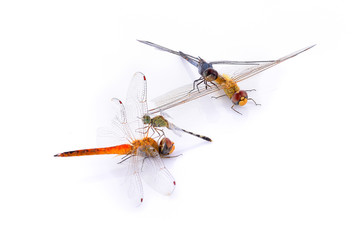Several reports suggested that rice seedling nursery-box application of some systemic insecticides (neonicotinoids and fipronil) is the cause of the decline in dragonfly species noted since the 1990s in Japan. We conducted paddy mesocosm experiments to investigate the effect of the systemic insecticides clothianidin, fipronil and chlorantraniliprole on rice paddy field biological communities.
Concentrations of all insecticides in the paddy water were reduced to the limit of detection within 3 months after application. However, residuals of these insecticides in the paddy soil were detected throughout the experimental period. Plankton species were affected by clothianidin and chlorantraniliprole right after the applications, but they recovered after the concentrations decreased. On the other hand, the effects of fipronil treatment, especially on Odonata, were larger than those of any other treatment. The number of adult dragonflies completing eclosion was severely decreased in the fipronil treatment.
These results suggest that the accumulation of these insecticides in paddy soil reduces biodiversity by eliminating dragonfly nymphs, which occupy a high trophic level in paddy fields.
Source: Atsushi Kasai, Takehiko I. Hayashi, Hitoshi Ohnishi, Kazutaka Suzuki, Daisuke Hayasaka & Koichi Goka
Scientific Reports volume 6, Article number: 23055 (2016)

- Login om te reageren
